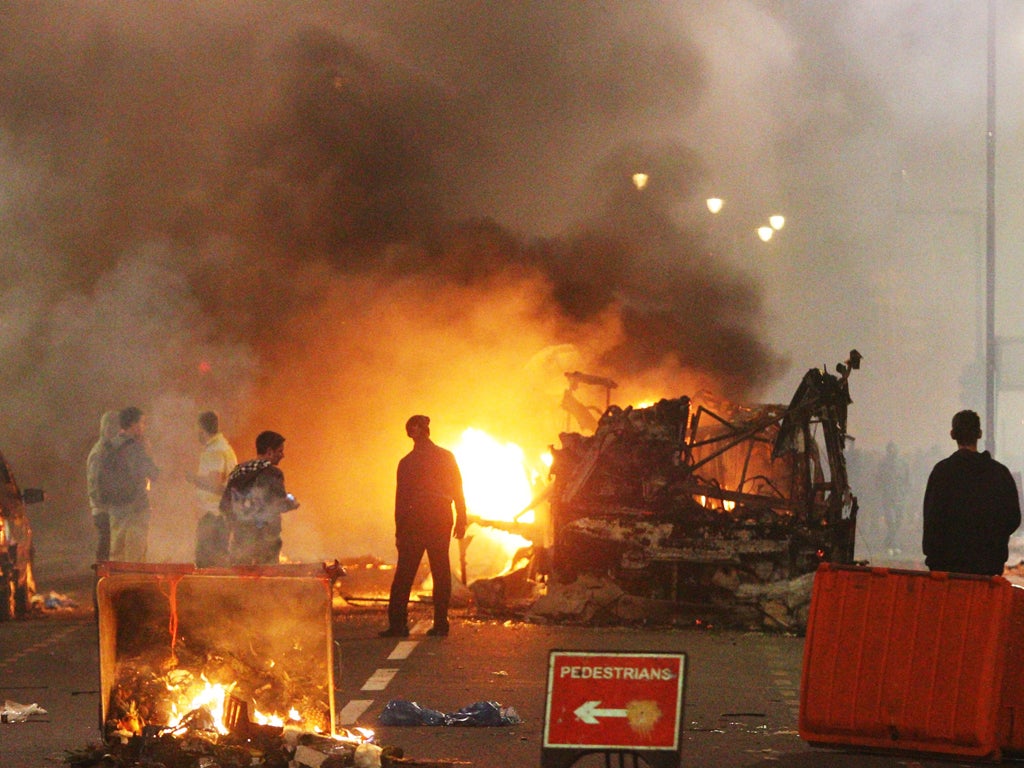Official: Cabinet ministers wrong about cause of riots
Young, poor and uneducated – but most rioters were not in gangs

Most of the young rioters arrested during this summer's violence came from the country's most deprived homes and were struggling at schools in poor neighbourhoods, the Government's own research has concluded.
Click HERE to view riots in numbers graphic (162 kb)
The findings contradict cabinet ministers' claims that the unrest in London and other English cities was fuelled by an aggressive gang culture, showing that the vast majority of looters acted alone.
Last night the Government was warned that society was storing up future problems by ignoring the growing number of disaffected young people growing up in poverty in the inner cities.
The analysis by the Home Office and the Ministry of Justice (MoJ) suggested that many of the looters were caught in a cycle of deprivation, poor educational attainment, unemployment and criminality. More than a third (35 per cent) of adult rioters appearing in court were living on benefits – three times the proportion nationally.
Almost two thirds (64 per cent) of the young rioters lived in the country's worst-off districts, with 42 per cent relying on free school meals. Two-thirds were classed as having special educational needs – three times the national average – and more than a third had been excluded from school in the past year. Just one in 10 had achieved five or more A* to C grades at GCSE, compared with more than half of pupils across the country.
The MoJ concluded: "It is clear that compared to population averages, those brought before the courts were more likely to be in receipt of free school meals or benefits, were more likely to have had special educational needs and be absent from school, and more likely to have some form of criminal history."
Rhian Beynon, of the charity Family Action, described the figures as a "devastating indictment of the way society has failed some of the poorest and most disadvantaged younger men". She added: "Poverty, disadvantage and disaffection experienced by this group are root causes of the August riots, and now their futures will be blighted by criminal sentences."
Days after the disturbances in August, David Cameron said gangs were "at the heart" of the trouble and announced he was calling in the US "supercop" Bill Bratton to advise on tackling gangs. Only three weeks ago Iain Duncan Smith, the Work and Pensions Secretary, claimed that gang members had played a "significant part" in the unrest.
But the Home Office found that only one in eight (13 per cent) of those arrested were gang members, rising to 19 per cent in London, but well below that in other parts of the country. It added: "Most [police] forces perceived that where gang members were involved, they did not play a pivotal role."
Just over three-quarters of those prosecuted had a previous conviction, including 26 per cent with 10 or more offences. Of those arrested, 40 per cent described themselves as white, 39 per cent as black, 11 per cent as mixed race, 8 per cent as Asian and 2 per cent from another background.
The figures also cast doubt on reports that foreign nationals were heavily involved in the disturbances. One in eight (13 per cent) of those jailed were born abroad, which is likely to reflect the make-up of the areas affected by the rioting.
Nick Herbert, the Policing minister, said: "These figures confirm that, in the vast majority of cases, existing criminals were out in force during the disturbances in August. The fact that half of recorded crimes were for offences like stealing and looting shows that most of what we saw was motivated by opportunity and greed."
Diane Abbott, the Labour MP for Hackney North and Stoke Newington, among the areas worst hit by the violence, said: "The fact that David Cameron blames gangs, pure and simple, shows just how little the Government really knows about inner-city areas. It is a series of much more complex issues that the Government needs to start engaging with."
Just over half the crimes committed during the four days of unrest were against businesses, with electrical and clothing stores the top targets, 19 per cent were against vehicles, while 13 per cent were muggings of passers-by.
Blame game: Who else pointed the finger
David Cameron (11 August)
"At the heart of all the violence sits the issue of the street gangs ... In the past few days, there is some evidence that they have been behind the co-ordination of the attacks on the police and the looting that has followed."
Ed Miliband (11 August)
"We need a sustained effort to tackle the gangs in our cities, something we knew about before these riots..."
Theresa May (11 August)
"The violence of the last five days raises searching questions ... Why does a violent gang culture exist in so many of our towns and cities?"
Nick Clegg (16 August)
"I don't think anyone could have witnessed last week's events and somehow been complacent about gang culture ... there is even some anecdotal evidence that gangs were co-operating to maximise their looting opportunities."
Iain Duncan Smith (3 October)
"The riots were a wake-up call on street gangs ... Gang members were not the sole perpetrators of the riots but they played a significant part."
Bookmark popover
Removed from bookmarks